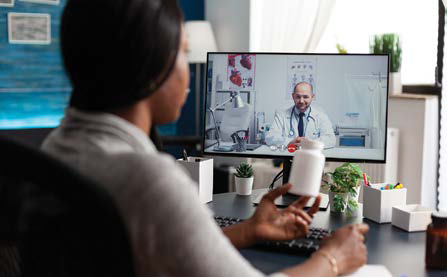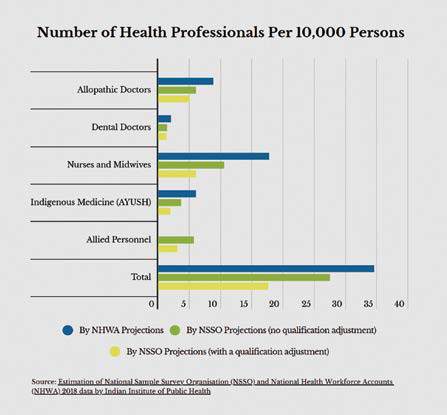In India, teleconsultation and tele-treatment have transformed the management of chronic diseases by overcoming the problems of healthcare accessibility and resource scarcity. This article investigates how teleconsultation affects accessibility, patient outcomes, and healthcare effectiveness. To provide patients with comprehensive care, it examines the role of tele-treatment in remote monitoring, medication management, and lifestyle coaching. The article also discusses the difficulties of managing chronic diseases in India and how teleconsultation helps. In addition to virtual consultations, virtual access to specialists, and its implications for prompt interventions and continuity of treatment, it covers the function of teleconsultation in distant diagnostics. It also examines potential developments and effects, including the use of developing technologies and AI. The article's conclusion highlights the revolutionary potential of teleconsultation while taking ethical and statutory considerations to make healthcare more patient-centric and accessible.

Teleconsultation, a cutting-edge field within healthcare services, offers remote consultation, diagnosis, and tele-treatment, benefiting both patients and healthcare professionals. This innovative approach provides enhanced accessibility to individuals with limited healthcare access especially in the rural parts of India, enabling them to receive necessary treatment and diagnosis without the need for travel. For individuals with chronic health conditions such as cardiac and kidney patients, this technological advancement proves invaluable by expediting their treatment processes and improving overall healthcare outcomes.
According to a 2021 World Health Organization (WHO) Report, India's healthcare system faced a substantial shortage of doctors, falling below the recommended ratio of 44.5 healthcare workers per 10,000 population in 2018 and only slightly exceeding the 2006 standard of 22.8. This significant deficit in the number of doctors required to meet the population's needs emphasises the challenge of healthcare accessibility. Teleconsultation emerges as a crucial solution, bridging the gap between doctors and patients and offering a way to overcome the healthcare accessibility challenge in India.

Tele-treatment is a transformative approach that revolutionises chronic disease management by leveraging technology to remotely deliver healthcare services. It encompasses various approaches such as remote monitoring, medication management, and lifestyle counselling to provide comprehensive care to patients. The significance of tele-treatment lies in its ability to enhance disease control, reduce hospital visits, and ultimately improve patient outcomes.
Remote Monitoring: Remote monitoring allows healthcare providers to track patients' health parameters from a distance using wearable devices and remote monitoring tools. This enables continuous monitoring of vital signs, blood glucose levels, or medication adherence, facilitating early detection of deviations and timely interventions.
Medication Management: Through tele-treatment, medication management utilises technology to assist with prescription management, medication reminders, and remote consultations. Patients receive timely reminders and education to ensure medication adherence and minimise errors, while healthcare providers remotely assess effectiveness and make necessary adjustments for optimised treatment outcomes.
Lifestyle Counselling: In tele-treatment, lifestyle counselling offers personalised guidance and support to help patients make positive lifestyle changes. Virtual consultations provide advice on diet, exercise, stress management, and more, empowering patients to take control of their health through ongoing support and motivation from healthcare providers.
According to the Health Ministry's 2021 report on the Longitudinal Aging Study In India (LSAI), findings from the initial phase (2017-2018) of the world's largest study on the elderly indicate that approximately 75 million individuals aged 60 and above experience various chronic illnesses.
Furthermore, the Rural Health Statistics for 2021, issued by the health ministry, revealed a shortage of doctors in both rural and urban areas. Primary Health Centres face a deficit of 7 per cent doctors, while Community Health Centres experience a substantial 57 per cent shortage. And according to the 2021 statistics, despite nearly two-thirds of the country's population residing in rural regions, only 33 per cent of the overall healthcare workforce and 27 per cent of doctors are available in rural areas.

Teleconsultation is essential for remote diagnosis of chronic diseases as it utilises communication technologies to connect patients with healthcare providers. This approach enables remote diagnosis and offers several benefits for patients and providers alike.
Additionally, teleconsultation platforms and technologies for remote diagnosis include video conferencing platforms like Zoom and Microsoft Teams, mobile health apps facilitating remote communication and health data sharing, and remote monitoring devices such as blood pressure monitors and wearable fitness trackers. Additionally, electronic health record systems provide access to patient records, test results, and informed diagnoses for healthcare providers.
Teleconsultation holds promise for chronic disease management by improving access to healthcare, enhancing monitoring and self-management, integrating AI for personalised treatment plans, enabling remote multidisciplinary care, and utilising advancements such as virtual reality, wearable devices, robotics, and secure data exchange. These advancements can increase efficiency, reduce costs, improve patient outcomes, address healthcare disparities, reshape the healthcare workforce, and raise ethical and legal considerations. Future teleconsultation technologies and strategies have the potential to transform healthcare systems, making them more patient-centric, efficient, and accessible while requiring careful attention to ethical and regulatory frameworks.
Teleconsultation has emerged as a transformative solution in chronic disease management. It offers remote diagnosis and tele-treatment, addressing the challenges of accessibility, limited resources, and geographical barriers faced by patients and healthcare providers. By enhancing accessibility, enabling remote monitoring, and empowering patients, teleconsultation improves healthcare outcomes for individuals with chronic conditions. However, challenges such as limited infrastructure, awareness, and adherence to treatment plans remain. Looking ahead, anticipated advancements in teleconsultation, including AI integration, remote multidisciplinary care, and emerging technologies, hold the potential to further revolutionise healthcare systems, making them more patient-centric and accessible while requiring careful consideration of ethical and regulatory aspects.